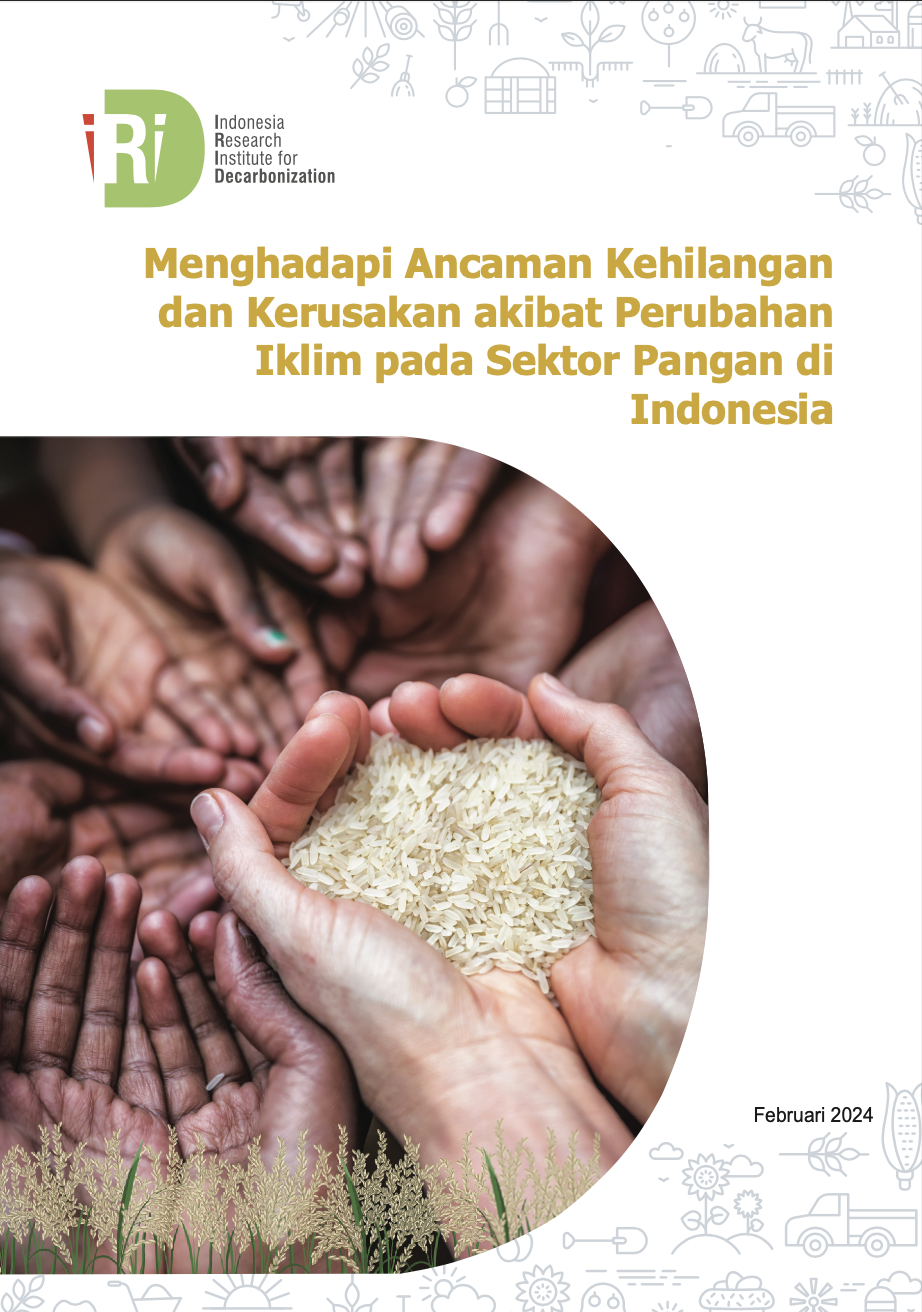The preamble of the Paris Agreement states that all climate actions measures should not threaten the global food production. This means that in the middle of climate change threats, ensuring global food security becomes crucial.
The Indonesia Research Institute for Decarbonization (IRID) acknowledges the need for Indonesia to assess its adaptability in the food sector, by addressing the potential loss and damage impacts due to climate change. To respond the issue, IRID held a discussion with a topic of "The Possible Loss and Damage due to Climate Change Impacts to Indonesia’s Food Security" on February 7th, 2024. Some of the key findings from the discussion are the following:
A. Financing energy transition at the national level
- Land intensification in the agricultural sector is still encouraged to utilize marginal lands rather than land extensification which will be implemented by clearing the land. Land extensification can lead to environmental imbalances.
- To ensure food security in Indonesia, the National Food Agency/NFA (Badan Pangan Nasional/Bapanas) provides logistic support for food production, such as river containers, mobile dryers, and corn dryers that can be managed by the local governments. NFA also collaborates with the Ministry of Transportation to build 39 sea-toll channels for food distribution from surplus areas to deficit areas.
- To ensure that food is available for people, Government of Indonesia develops a Food Security and Vulnerability Atlas/FSVA, which to be updated every year. By having FSVA, the Government could identify the national food stock available to be distributed to priority areas. To update the FSVA, a coordination between National Development Planning Agency (Badan Perencanaan Pembangunan Nasional/Bappenas), National Population and Family Planning Board (Badan Kependudukan dan Keluarga Berencana Nasional/BKKBN) and Coordinating Ministry for Human Development and Cultural Affairs (Kementerian Koordinator Bidang Pembangunan Manusia dan Kebudayaan/Kemenko PMK) is made.
- To protect farmers from crop failure, the Government of Indonesia provides Paddy Farming Business Insurance (Asuransi Usaha Tani Padi/AUTP) and Cattle Business Insurance (Asuransi Usaha Ternak Sapi/Kerbau/AUTS/K) managed by the Directorate General of Agricultural Infrastructure and Facilities, Ministry of Agriculture.
B. Related to the Marine and Fisheries Sector
- Ministry of Marine Affairs and Fisheries (KKP) together with the Meteorological, Climatological, and Geophysical Agency (BMKG) are responsible for disseminating information related to weather conditions at each fishery port, such as information on wave height and wind speed. Aside from that, every fishing vessel requires a port clearance or sailing approval letter issued by the port head, by considering weather condition information to protect fishermen.
- Distribution of sea products, such as fish, becomes an issue in the marine and fisheries sector. While the demand of fish is heavily at the western part of Indonesia, the fish stock is available in the eastern part of Indonesia. As the cost for shipping fish from eastern part to western part of Indonesia is very expensive, the solution taken was to import fish from elsewhere. The need to collaborate with the Ministry of Transportation was then raised, to cut the number of imports and at the same time, reducing the transportation cost of sea products from eastern part to the western part of Indonesia.
- To support the livelihood of fishermen in Indonesia, KKP through the Advanced Fisherman's Village (Kampung Nelayan Maju) program has helped around 60 fishing villages every year to build supporting infrastructure. To provide electricity for instance, KKP collaborates with the National Electricity Company (Perusahaan Listrik Negara/PLN). The type of collaboration with PLN can be further assessed to support fish storage facilities, such as cold storage.
C Others
- Disasters that occur in Indonesia, such as flood and landslides, need to be seen from two sides: as disasters due to climate change and disasters due to land function mismatches. However, the food availability depends on the governance of the food system, with climate change impacts worsened it. As an example, climate-related information often does not reach farmers and fishermen, which made them difficult to anticipate the impacts. If farmers, for instance, know that there will be heavy rains which could cause flooding, they could adjust the way they do farming at the earliest stage.
- The Government of Indonesia needs to agree on a common definition regarding the climate change impact that leads to loss and damage, particularly the slow onset events. The definition is important to ensure that the national budget can be attributed to such events.
NB:(This original publication is only available in Bahasa Indonesia)
.. . . . . . .
. . .
. . . . . . . . . . . . .
Share:





